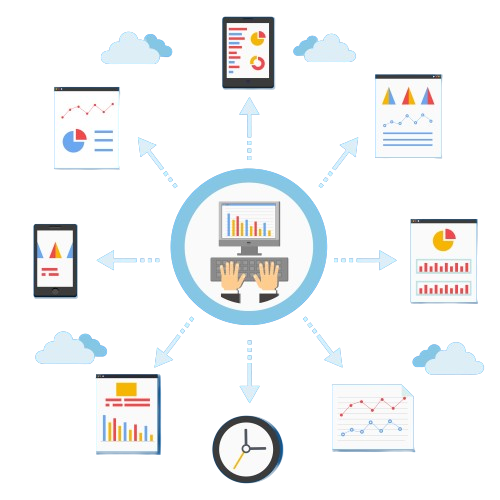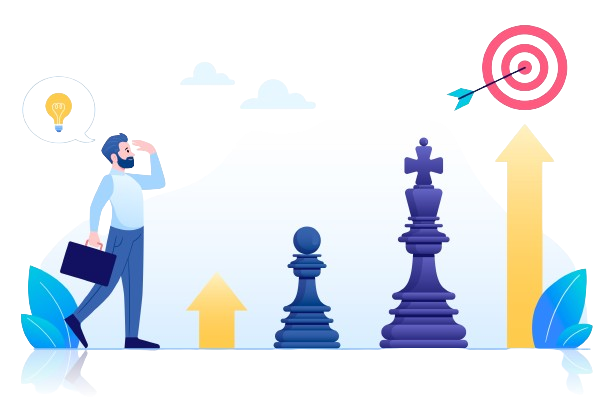 In our previous discussion about CRM software features, we dove into the world of cross-channel integration. Think of it like connecting different parts of a puzzle to create a complete picture. We learned that this isn’t just about technology; it’s a crucial strategy for businesses to understand and connect with customers better. We explored why businesses are focusing on this seamless connection between different systems and platforms, and how it makes the experience smoother for everyone involved.
In our previous discussion about CRM software features, we dove into the world of cross-channel integration. Think of it like connecting different parts of a puzzle to create a complete picture. We learned that this isn’t just about technology; it’s a crucial strategy for businesses to understand and connect with customers better. We explored why businesses are focusing on this seamless connection between different systems and platforms, and how it makes the experience smoother for everyone involved.
Why It Matters: Making Things Easier for Everyone
Imagine integration like a superhighway where information flows smoothly. It’s not just a tech thing; it’s about making things easier for users and businesses. We talked about how this seamless connection enhances user experience, ensuring people can move effortlessly across different platforms. We also looked at the key platforms that make this happen and the importance of keeping all the information synchronized and up-to-date. Lastly, we saw how this integration transforms the way businesses understand and map out a customer’s journey, making interactions smoother and more personalized. As we continue, we’ll explore how businesses can use this powerful tool to reshape their strategies and find success in the digital age. So, let’s get started!Understanding the Integration of CRM Features for Marketing Automation
 Integrating features of CRM software into marketing automation is about breaking down silos within an organization. CRM systems traditionally focus on managing customer interactions and relationships, while marketing automation is centered around optimizing marketing processes. By integrating these two functionalities, businesses can create a unified ecosystem where customer data seamlessly flows between marketing efforts and customer management.
Integrating features of CRM software into marketing automation is about breaking down silos within an organization. CRM systems traditionally focus on managing customer interactions and relationships, while marketing automation is centered around optimizing marketing processes. By integrating these two functionalities, businesses can create a unified ecosystem where customer data seamlessly flows between marketing efforts and customer management.
- Unified Customer Profiles: Integrating CRM features allows for the creation of unified customer profiles that aggregate data from various touchpoints. This comprehensive view enables marketers to understand customer behavior, preferences, and engagement history.
- Streamlined Lead Management: Marketing automation, when integrated with CRM, facilitates streamlined lead management. Leads generated through marketing campaigns are seamlessly transferred to the CRM system, ensuring a cohesive lead nurturing process.
- Personalized Communication: The integration enables marketers to send personalized and targeted communications based on CRM data. Whether it’s tailoring emails to specific customer segments or delivering personalized content, the synergy between CRM and marketing automation enhances communication effectiveness.
How To Enhance Targeted Campaigns through Cross-Channel Data?
 The true power of integrating features of CRM software for marketing automation lies in the ability to enhance targeted campaigns across various channels. This approach recognizes that modern consumers interact with brands through multiple touchpoints, and a unified strategy is essential for creating a consistent and personalized experience.
The true power of integrating features of CRM software for marketing automation lies in the ability to enhance targeted campaigns across various channels. This approach recognizes that modern consumers interact with brands through multiple touchpoints, and a unified strategy is essential for creating a consistent and personalized experience.
- Multi-Channel Customer Journey: CRM integration enables businesses to track and understand the customer journey across multiple channels. Whether a customer engages through social media, email, or the website, the CRM system captures this data, providing a holistic view of their interactions.
- Automated Campaign Triggers: With marketing automation, businesses can set up automated triggers based on CRM data. For example, if a customer reaches a certain milestone or exhibits specific behavior, an automated campaign can be triggered to deliver targeted content or promotions.
- Dynamic Content Personalization: Leveraging CRM data, marketing automation tools can dynamically personalize content across channels. This personalization goes beyond just addressing customers by their names; it involves tailoring content based on their preferences, purchase history, and engagement patterns.
- Consistent Messaging and Branding: Integration ensures that messaging and branding remain consistent across all channels. Whether a customer interacts with a brand through social media, email, or a mobile app, the integrated CRM and marketing automation system ensures a unified and coherent brand experience.
- Optimized Customer Engagement: By harnessing cross-channel data, businesses can optimize customer engagement strategies. Insights from CRM systems help identify the most effective channels for specific customer segments, allowing for targeted campaigns that resonate with the audience.
Streamlining the Sales Process In Cross Channel Integration
 Sales acceleration is not merely about speed; it’s about optimizing each stage of the sales funnel to drive efficiency and effectiveness. Cross-channel integration plays a pivotal role in streamlining the sales process by creating a unified environment where sales teams can access, track, and act upon relevant data seamlessly.
Sales acceleration is not merely about speed; it’s about optimizing each stage of the sales funnel to drive efficiency and effectiveness. Cross-channel integration plays a pivotal role in streamlining the sales process by creating a unified environment where sales teams can access, track, and act upon relevant data seamlessly.
- Unified Customer Data:
Improving Lead Management
Effective lead management is the backbone of successful sales operations. Cross-channel integration optimizes lead management processes, ensuring that leads are nurtured, qualified, and progressed through the sales funnel efficiently. 1. Holistic Lead Scoring: Integrated platforms allow for the creation of comprehensive lead scoring models that take into account various touchpoints and engagement metrics. This holistic approach ensures that leads are prioritized based on a complete understanding of their interactions across channels. 2. Personalized Engagement: Leveraging integrated customer data, sales teams can craft highly personalized engagement strategies. Whether it’s tailoring communication based on previous interactions or recommending products based on customer preferences, personalized engagement enhances the likelihood of conversion. 3. Automated Lead Nurturing: Cross-channel integration enables the automation of lead nurturing campaigns. By setting up automated triggers and responses based on lead behavior, businesses can maintain consistent and relevant communication with leads, nurturing them through the sales funnel. 4. Data-Driven Decision-Making: Integrated platforms provide rich analytics and reporting capabilities, empowering sales teams to make data-driven decisions. By analyzing lead behavior and engagement metrics, sales professionals can refine their strategies and allocate resources more effectively.Improving Conversion Rates
 Ultimately, the goal of sales acceleration is to improve conversion rates and drive revenue growth. Cross-channel integration contributes significantly to this objective by creating an environment where leads are effectively managed, and the sales process is optimized.
1. Reducing Friction in the Sales Funnel:
Integrated platforms help identify and eliminate points of friction in the sales funnel. Whether it’s a cumbersome onboarding process or a disconnect between marketing and sales touchpoints, addressing these issues enhances the overall customer experience and improves conversion rates.
2. Timely Follow-Ups:
With real-time updates and automated workflows, sales teams can ensure timely follow-ups with leads. Whether it’s sending a personalized follow-up email, making a phone call, or scheduling a demo, integrated platforms streamline the follow-up process, reducing the likelihood of leads going cold.
3. Cross-Sell and Up-Sell Opportunities:
Integrated platforms enable businesses to identify cross-sell and up-sell opportunities based on comprehensive customer profiles. By understanding the complete customer journey, sales teams can present relevant additional products or services, increasing the average deal size and maximizing revenue.
4. Enhanced Customer Retention:
Improved lead management and a streamlined sales process contribute to enhanced customer satisfaction. Satisfied customers are more likely to become repeat customers, driving customer retention and long-term revenue growth.
In conclusion, sales acceleration with cross-channel integration is a multifaceted strategy that optimizes the sales process, refines lead management, and ultimately improves conversion rates. Businesses that strategically leverage integrated platforms gain a competitive edge.
Ultimately, the goal of sales acceleration is to improve conversion rates and drive revenue growth. Cross-channel integration contributes significantly to this objective by creating an environment where leads are effectively managed, and the sales process is optimized.
1. Reducing Friction in the Sales Funnel:
Integrated platforms help identify and eliminate points of friction in the sales funnel. Whether it’s a cumbersome onboarding process or a disconnect between marketing and sales touchpoints, addressing these issues enhances the overall customer experience and improves conversion rates.
2. Timely Follow-Ups:
With real-time updates and automated workflows, sales teams can ensure timely follow-ups with leads. Whether it’s sending a personalized follow-up email, making a phone call, or scheduling a demo, integrated platforms streamline the follow-up process, reducing the likelihood of leads going cold.
3. Cross-Sell and Up-Sell Opportunities:
Integrated platforms enable businesses to identify cross-sell and up-sell opportunities based on comprehensive customer profiles. By understanding the complete customer journey, sales teams can present relevant additional products or services, increasing the average deal size and maximizing revenue.
4. Enhanced Customer Retention:
Improved lead management and a streamlined sales process contribute to enhanced customer satisfaction. Satisfied customers are more likely to become repeat customers, driving customer retention and long-term revenue growth.
In conclusion, sales acceleration with cross-channel integration is a multifaceted strategy that optimizes the sales process, refines lead management, and ultimately improves conversion rates. Businesses that strategically leverage integrated platforms gain a competitive edge.
Customer Support and Service Integration
This involves integrating customer support and service functions seamlessly, ensuring that interactions with customers are consistent, efficient, and personalized. Leveraging CRM features plays a pivotal role in achieving this unified experience, providing businesses with the tools needed to streamline service interactions and enhance overall customer satisfaction.Understanding the Need for Integration
Customer support is no longer a standalone function within a business. In today’s interconnected world, customers expect a cohesive experience across various touchpoints. When customer support and service functions operate in isolation, it can lead to fragmented interactions, delayed responses, and a disjointed perception of the brand. Integration becomes the solution, allowing businesses to centralize customer information, communication channels, and service processes within a unified CRM framework.Key Components of a Unified Customer Support Experience
- Centralized Customer Data: Integration allows for a centralized database where all customer interactions, history, and preferences are stored. This comprehensive view enables support agents to provide personalized and contextually relevant assistance.
- Multichannel Support: Integration ensures that customer interactions across various channels – be it email, phone, chat, or social media – are consolidated. Agents can seamlessly switch between channels while maintaining a consistent conversation history.
- Automated Ticketing System: CRM features facilitate the creation of an automated ticketing system. When a customer contacts support, a ticket is generated and tracked within the CRM, ensuring that no query goes unresolved and enabling efficient case management.
- Real-Time Communication: Integration allows for real-time communication and collaboration among support agents. This ensures that information is shared instantly, leading to quicker problem resolution and a more efficient support process.
- Service Level Agreements (SLAs) and Escalation Rules: CRM features enable the implementation of SLAs and escalation rules for support tickets. This ensures that customer issues are addressed within defined timeframes, contributing to higher customer satisfaction and loyalty.
Leveraging CRM Features for Seamless Service Interactions
- 360-Degree Customer View:
CRM systems provide a 360-degree view of each customer, consolidating data from various touchpoints. This comprehensive profile equips support agents with the insights needed to understand customer needs, preferences, and history.
2. Personalized Support:
Leveraging CRM features enables the delivery of personalized support experiences. By understanding customer preferences and history, agents can tailor their responses and recommendations, fostering a more meaningful and engaging customer interaction.
3. Automation of Routine Tasks:
CRM features allow for the automation of routine and repetitive tasks in the support process. This includes automating ticket assignment, responses to common queries, and follow-up communications, freeing up agents to focus on more complex customer issues.
4. Knowledge Base Integration:
Integrating CRM with a knowledge base allows support agents to access a repository of information, FAQs, and troubleshooting guides directly from the CRM interface. This empowers agents with the information needed to provide accurate and timely solutions.
5. Customer Feedback and Analytics:
CRM features enable the collection of customer feedback and analytics on support interactions. Businesses can analyze customer sentiment, identify trends, and continuously improve the support experience based on data-driven insights.
Challenges and Considerations
While the benefits of customer support and service integration are substantial, businesses must navigate challenges such as data security, system compatibility, and the need for employee training. Addressing these challenges through careful planning and strategic implementation is crucial to ensuring a smooth integration process.

Creating a unified customer support experience through CRM integration is not just a technological enhancement; it’s a strategic imperative for businesses aiming to deliver exceptional customer service. The journey towards a unified customer support experience is an investment in customer satisfaction, and ultimately, in the success and growth of the business.
Future Trends in Cross-Channel Integration
As businesses continue to navigate the CRM marketplace, the future promises a wave of emerging technologies that will significantly impact cross-channel integration. These innovations not only enhance the functionality of CRM systems but also redefine how businesses connect with their customers across various channels. Let’s discuss the emerging technologies shaping the future of cross-channel integration.
Artificial Intelligence (AI) and Machine Learning (ML):
Current Landscape: AI and ML have already made significant strides in CRM, offering predictive analytics and automation capabilities to streamline processes.
Future Impact: The integration of AI and ML in cross-channel systems will lead to more intelligent automation. Predictive analytics will become even more accurate, allowing businesses to anticipate customer needs and deliver highly personalized experiences across channels.
Internet of Things (IoT) Integration:
Current Landscape: IoT has been primarily associated with connected devices, but its integration with CRM is becoming increasingly prevalent.
Future Impact: As IoT devices continue to proliferate, their integration with CRM systems will enable businesses to collect real-time data from a multitude of sources. This data can be leveraged to gain deeper insights into customer behavior and preferences, facilitating more informed decision-making.
Blockchain for Enhanced Security:
Current Landscape: Blockchain technology has gained traction in various industries for its secure and transparent transaction capabilities.
Future Impact: Integrating blockchain into cross-channel CRM will enhance security and data integrity. Businesses can build trust with customers by ensuring that their data is protected and transactions are tamper-proof across all integrated platforms.
Augmented Reality (AR) and Virtual Reality (VR) Integration:
Current Landscape: AR and VR technologies are primarily used for immersive experiences in industries like gaming and entertainment.
Future Impact: In the realm of CRM, AR and VR integration will revolutionize customer interactions. Virtual showrooms, immersive product experiences, and interactive customer support sessions will become integral components of cross-channel strategies.
Voice-Activated Systems:
Current Landscape: Voice-activated systems like virtual assistants have gained popularity in consumer technology.
Future Impact: Integrating voice-activated features into cross-channel CRM will enable customers to interact with businesses using natural language. This will not only streamline processes but also enhance accessibility for users with diverse needs.
Expected Developments in CRM and Cross-Channel Integration
Looking ahead, the future of CRM and cross-channel integration holds exciting developments that will shape the way businesses manage customer relationships and streamline operations.
1. Unified Customer Data Platforms (CDP):
Current Landscape: Customer data is often scattered across various systems, making it challenging to create a unified customer profile.
Anticipated Development: The future will see the rise of more comprehensive Customer Data Platforms, providing a centralized hub for all customer data. This unified approach will empower businesses to gain a holistic view of customer interactions across channels.
2. Predictive and Prescriptive Analytics:
Current Landscape: Predictive analytics forecast future trends based on historical data.
Anticipated Development: The evolution towards prescriptive analytics will not only predict future customer behavior but also recommend actions to maximize positive outcomes. This proactive approach will empower businesses to make data-driven decisions with more immediate and tangible impacts.
3. Greater Customization and Personalization:
Current Landscape: Personalization is a key focus in CRM, but there’s room for even more granular customization.
Anticipated Development: The future will witness CRM systems that can dynamically adjust content, offers, and interactions in real-time based on individual customer preferences. This level of personalization will foster stronger customer loyalty and engagement.
4. Enhanced Automation and AI-driven Workflows:
Current Landscape: Automation is prevalent in CRM, but future developments will take it to new heights.
Anticipated Development: AI-driven workflows will become more sophisticated, handling complex tasks and decision-making processes. This level of automation will significantly reduce manual intervention and improve overall efficiency.
5. Seamless Integration with Emerging Communication Channels:
Current Landscape: Businesses currently focus on established communication channels like email, social media, and websites.
Anticipated Development: Future CRM systems will seamlessly integrate with emerging communication channels such as messaging apps, chatbots, and other innovative platforms. This will ensure that businesses stay ahead in meeting customers where they are most active.
The future of cross-channel integration in CRM is marked by a convergence of advanced technologies and strategic developments. As the integration landscape evolves, businesses should remain agile and proactive in adopting these innovations to stay competitive in the ever-changing market.
Conclusion: The Future Landscape of CRM and Integration
The significance of cross-channel integration has become more apparent than ever. As we reflect on the journey through this blog, it’s essential to recap the key takeaways regarding the importance of cross-channel integration and, perhaps more intriguingly, anticipate the evolving role it will play in shaping CRM strategies in the future.
Recap of the Importance of Cross-Channel Integration
The recap begins with acknowledging the pivotal role that cross-channel integration plays in existing CRM strategies. Businesses are no longer confined to managing customer interactions through a single touchpoint; instead, they navigate a complex web of channels, from social media and email to in-person interactions and e-commerce platforms.
- Unified Customer Experience: Cross-channel integration ensures a unified customer experience by harmonizing data across various touchpoints. It eliminates the silos that can hinder a seamless customer journey, allowing businesses to provide consistent and personalized interactions regardless of the channel.
- Enhanced Data Synchronization: One of the critical aspects emphasized was the need for effective data synchronization. The ability to keep information consistent and up-to-date across different platforms ensures that businesses have a comprehensive and accurate view of their customers, fostering better decision-making.
- Improved Marketing and Sales Efforts: Integration empowers marketing and sales teams by facilitating a holistic approach to customer engagement. Through integrated platforms, businesses can execute targeted and personalized campaigns, streamline sales processes, and ultimately drive better conversion rates.
- Optimized Customer Support: Integration extends to customer support, creating a unified support experience. When service teams have access to a customer’s complete interaction history, they can provide more efficient and tailored assistance, leading to improved customer satisfaction.
Looking Ahead to the Evolving Role of Integration in CRM Strategies
As we peer into the future, it’s evident that cross-channel integration will not merely be a feature but a fundamental pillar of CRM strategies. Here are some insights into the evolving role integration is likely to play:
- AI and Predictive Analytics Integration: The future holds the integration of advanced technologies such as artificial intelligence (AI) and predictive analytics into CRM systems. This integration will empower businesses to anticipate customer needs, automate decision-making processes, and provide hyper-personalized experiences.
- Extended IoT Integration: With the increasing prevalence of the Internet of Things (IoT), CRM systems will evolve to integrate data from connected devices. This expansion will enable businesses to gain insights into customer behaviors and preferences based on real-time data from smart devices.
- Blockchain for Enhanced Security: Integration with blockchain technology is anticipated to become a standard for ensuring heightened security and transparency in CRM systems. This will be particularly crucial for industries where data security and integrity are paramount, such as finance and healthcare.
- Augmented Reality (AR) and Virtual Reality (VR) Integration: As AR and VR technologies advance, integrating them into CRM strategies will open new avenues for immersive customer experiences. This could involve virtual product demonstrations, enhanced training modules, and interactive virtual storefronts.
- Greater Emphasis on Cross-Functional Integration: The future landscape will witness a greater emphasis on breaking down organizational silos through cross-functional integration. This means that CRM systems will seamlessly integrate with various departments, including finance, human resources, and supply chain, for a more holistic view of business operations.
- Continuous Adaptation to Industry-Specific Needs: The evolving role of integration will also involve CRM systems adapting continuously to meet industry-specific needs. Customization and flexibility will be key as businesses seek tailored solutions that align precisely with the unique demands of their sectors.
Thus, the future of CRM and integration is undeniably intertwined with innovation and technological advancements. As CRM software strategies continue to evolve, those embracing the full potential of cross-channel integration will undoubtedly be at the forefront of delivering exceptional customer experiences in the years to come.